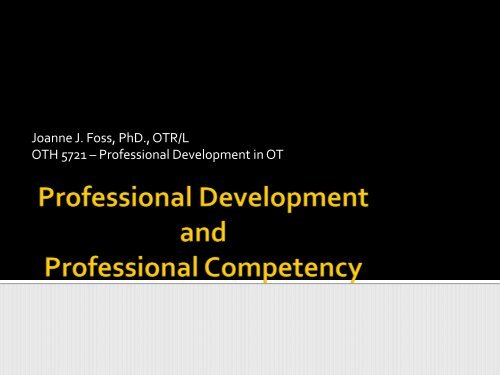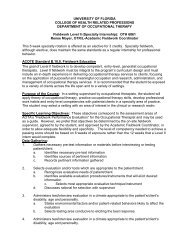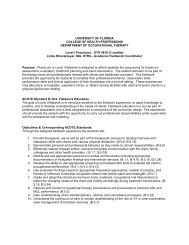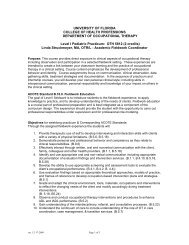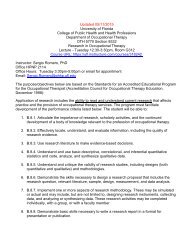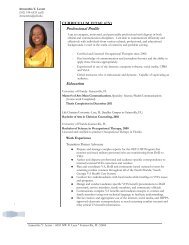Professional Development and Professional Competency
Professional Development and Professional Competency
Professional Development and Professional Competency
Create successful ePaper yourself
Turn your PDF publications into a flip-book with our unique Google optimized e-Paper software.
Joanne J. Foss, PhD., OTR/L<br />
OTH 5721 – <strong>Professional</strong> <strong>Development</strong> in OT
Purpose: To guide the process of professional<br />
development: self-reflection <strong>and</strong> selfassessment,<br />
identification of specific<br />
individual competencies for development,<br />
goal setting, <strong>and</strong> selection of educational,<br />
professional development <strong>and</strong> growth<br />
activities
• focus on career development;<br />
• achieving <strong>and</strong> maintaining excellence <strong>and</strong><br />
gaining expertise;<br />
• assuming new <strong>and</strong> more complex roles;<br />
• implementing new information into practice<br />
(continuing competence).<br />
<strong>Professional</strong> <strong>Development</strong> is Self-Directed.
“ No one, at any given time in his or her career, has the<br />
entire breadth <strong>and</strong> scope of knowledge, skills, <strong>and</strong><br />
attitudes to carry out chosen goals.<br />
<strong>Professional</strong> growth, like human development,<br />
flows along a continuum that is not linear but<br />
bumpy, at times convoluted <strong>and</strong> unpredictable,<br />
<strong>and</strong> certainly only partially planned. Many<br />
choose to go with the flow, content to make the<br />
best of what befalls them. On the other h<strong>and</strong>,<br />
some may prefer to take a stronger role in shaping<br />
their career path. Nevertheless, professional growth<br />
merely begins at entry-level education <strong>and</strong> fieldwork<br />
<strong>and</strong> then extends throughout a “career-time.”<br />
Robertson, SC & Savio, MG. (2003, November 17). Mentoring as professional development. OT<br />
Practice, 8, 20-27.
Prerequisite knowledge, skills <strong>and</strong> attitudes to:<br />
perform the processes of evaluation, intervention<br />
planning <strong>and</strong> implementation, <strong>and</strong> outcome<br />
measurement as they relate to occupation <strong>and</strong><br />
participation.<br />
Threshold: education based competencies;<br />
evaluation of fieldwork performance <strong>and</strong> NBCOT<br />
performance
Content <strong>and</strong> Process:<br />
OT theory & knowledge<br />
OT skills & techniques<br />
______________________<br />
Personal Reflection:<br />
learning style<br />
communication style<br />
personality traits<br />
beliefs & perceptions<br />
biases<br />
life experiences<br />
values<br />
philosophy of education<br />
philosophy of illness<br />
philosophy of caring
• Ability to:<br />
• Transfer new knowledge to practice.<br />
• Responsibility to implement “best practice”.<br />
In-effective practice an ethical problem.<br />
Threshold: Current skills; job-specific abilities;<br />
client outcomes, client satisfaction, adherence<br />
to company policies <strong>and</strong> protocols, behaviors,<br />
etc.
• What are the new expectations?<br />
• What are the new responsibilities?<br />
• What knowledge, interpersonal <strong>and</strong> personal skills<br />
are required?<br />
• What types of critical thinking <strong>and</strong> reasoning skills<br />
are needed?<br />
• What expectations do others have?<br />
• Are there changes in technology, professional<br />
expectations, personal expectations that will effect<br />
my performance?<br />
“What do I need to do to meet these changes?”
Reflection<br />
Demonstrate<br />
change<br />
Self<br />
Assessment<br />
Document<br />
performance<br />
Identify<br />
goals<br />
Implement<br />
plan<br />
Develop<br />
plan
• Start with self-reflection <strong>and</strong> self-assessment
• Student<br />
• Entry-level therapist<br />
• Novice (1 – 3 years)<br />
• Advanced beginner (~5 years)<br />
• Competent<br />
• Proficient<br />
• Expert
• Establish a base line for developing goals <strong>and</strong><br />
a plan; internal <strong>and</strong> external feedback<br />
• Internal: OTAS; formal method of selfassessment<br />
• External or 360 degree approach: feedback<br />
from peers (colleagues), supervisors,<br />
instructors, mentors, <strong>and</strong> others.<br />
• Self-Reflection on experiences; what did I<br />
learn, what more do I need to know, etc.
Reflect on:<br />
• Strengths <strong>and</strong> weaknesses<br />
• Personal attributes<br />
• Assess obligations to family<br />
• Job responsibilities <strong>and</strong> requirements
Reflection<br />
Demonstrate<br />
change<br />
Self<br />
Assessment<br />
Document<br />
performance<br />
Identify<br />
goals<br />
Implement<br />
plan<br />
Develop<br />
plan
• “Vision Statement”<br />
• Summarizes aspirations <strong>and</strong> desires<br />
• Five Year Plan: entry-level years<br />
• 1 to 3 year<br />
• 3 to 5 year<br />
• Type of job, level of responsibility, level of<br />
training or education, type of environment, level<br />
of specialization.
• What additional knowledge do I need?<br />
• How will I develop critical reasoning for use in<br />
my practice?<br />
• What additional interpersonal abilities do I<br />
need?<br />
• Will I need to develop particular performance<br />
skills?
• How will I know have achieved (or made<br />
progress) meeting each goal?<br />
• Gained a new attitude, values or perspectives?<br />
• Gained experience, new strategies, knowledge<br />
or techniques?<br />
• Gained a new level of expertise, new level of<br />
competence?
1. Specific <strong>and</strong> measureable; identify specific<br />
behaviors, skills, attitudes <strong>and</strong> actions.<br />
2. Important both personally <strong>and</strong> professionally.<br />
3. Consistent with your mission statement.<br />
4. Attainable.<br />
5. Feasible; consider your personal, professional <strong>and</strong><br />
institutional resources.<br />
6. Performance focused.<br />
7. Observable.<br />
8. Measurable.<br />
9. Verifiable.
In 3 years I will be practicing in a rehabilitation<br />
setting. I will feel confident performing clientcentered<br />
evaluations <strong>and</strong> designing<br />
appropriate intervention plans. I will study<br />
leadership <strong>and</strong> supervision skills for an<br />
eventual leadership/supervisory role. I will<br />
begin pursuing a board certification in<br />
Gerontology.
I will feel confident performing client-centered evaluations<br />
<strong>and</strong> designing appropriate intervention plans.<br />
Plan:<br />
• Seek out opportunities to learn from more experienced<br />
colleagues by soliciting feedback on performance.<br />
• Attend professional presentations available on site <strong>and</strong> at<br />
conferences.<br />
• Organize self-study program to strengthen an area of<br />
weakness (dysphagia); specific readings <strong>and</strong> CE<br />
workshops.
I will study leadership <strong>and</strong> supervision skills for an<br />
eventual leadership/supervisory role.<br />
Plan:<br />
• Apply to AOTAs Emerging Leaders <strong>Development</strong><br />
program.<br />
• Attend a comprehensive workshop on leadership,<br />
<strong>and</strong> CE courses <strong>and</strong> training programs in<br />
supervision.<br />
• Be active in my community; using these<br />
opportunities to build my confidence <strong>and</strong> practice<br />
leadership <strong>and</strong> organizational skills.
I will begin pursuing a board certification in<br />
Gerontology.<br />
Plan:<br />
• Investigate required activities <strong>and</strong> experience<br />
needed to gain certificate<br />
• Form a comprehensive plan, with deadlines, for<br />
the activities needed<br />
• Organize <strong>and</strong> build my portfolio to document<br />
my expertise in Gerontology.
• I will be proficient in the OT process.<br />
Measures of patient outcomes will reflect my<br />
growing expertise.<br />
• I will be supervising students, techs <strong>and</strong> aids.<br />
I will have obtained a leadership position in<br />
my state OT association.<br />
• I will accomplish my Board certification by<br />
the end of my 5 th year in the profession.
• I will be proficient in the OT process. Measures of patient outcomes will reflect my<br />
expertise.<br />
• Be evaluated by an OT with 5 more years experience.<br />
• Conduct an “audit” of the D/C patient reports.<br />
• I will give a interdisciplinary presentation at my facility in Adult Dysphagia.<br />
• I will be supervising students, techs <strong>and</strong> aids.<br />
• Conduct an “audit” of student feedback.<br />
• Complete AOTAs fieldwork educators training program.<br />
• I will have obtained a leadership position in my state OT association.<br />
• Volunteer for task force or ad hoc committees in FOTA <strong>and</strong>/or the local OT forum.<br />
• Run for elected office in AOTA.<br />
• Volunteer for task force or committee with AOTA or NBCOT.<br />
• I will accomplish my Board certification by the end of my 5 th year in the profession.<br />
• Submit documentation to AOTA .<br />
• Revise resume <strong>and</strong> employment documents to reflect certification.
GOAL: I WILL HAVE a portfolio to document my professional development activities.<br />
Specific: I will create a portfolio with documented activities in learning <strong>and</strong> growth,<br />
education <strong>and</strong> scholarly activities, <strong>and</strong> professional <strong>and</strong> community service.<br />
Measurable: I’ll know this goal is completed when I have submitted my portfolio to my<br />
mentor.<br />
Attainable: I have taken some classes, I have a mentor <strong>and</strong> web resources available, so I<br />
will easily be able to construct a portfolio.<br />
Relevant: This is important in order to document the professional development activities<br />
I engage in outside of the classroom, <strong>and</strong> to assist me to direct me career development.<br />
Timely: I will complete the first phase of this project <strong>and</strong> submit it by the due date in<br />
April, 2013.
• To attend activities with a variety of health<br />
professionals; learn about the differing<br />
perspectives on health care issues.<br />
• To meet <strong>and</strong> network with OTs that have more<br />
experience than me.<br />
• Make a presentation to a professional audience.<br />
• To gain experience working people that are<br />
different than me; race, religion & disability.<br />
• Take a leadership role in an activity or activities that<br />
contribute to the potential clients or the OT<br />
profession.
I will feel confident performing client-centered<br />
evaluations <strong>and</strong> designing appropriate<br />
intervention plans.<br />
• OTAS items?<br />
Plan:
• Vision Statement (purpose statement)<br />
• Identification of professional goals<br />
• Self, peer <strong>and</strong> faculty evaluations using OTAS<br />
• Performance evaluations by Clinical Educators<br />
• Documentation of participation:<br />
• Learning <strong>and</strong> growth activities<br />
• <strong>Professional</strong> service<br />
• Community Service
• Credentials: education, certifications, licenses, professional<br />
memberships<br />
• Honors, Recognitions, Awards, <strong>and</strong> Achievements: student<br />
awards <strong>and</strong> scholarships, residencies, fellowships, etc.<br />
• <strong>Professional</strong> Service: national, state, university, college, local <strong>and</strong><br />
community leadership <strong>and</strong> service activities.<br />
• Scholarly Activities: publications, research activities, grants,<br />
presentation activities, performance evaluations, etc.<br />
• Educational Activities: learning opportunities outside the formal<br />
classroom (attending or participating in lectures, presentations,<br />
conferences, workshops, etc.)<br />
• Community Volunteer Activities: professional volunteer activities<br />
<strong>and</strong> community service.
• Identify one step you can take this semester that will move you<br />
toward your long term goal. Once you have that step identified, put<br />
together a plan for how you will make it happen.<br />
• Master something new. Growth is what you <strong>and</strong> your career are all<br />
about. Growth only comes from learning something new.<br />
• Take responsibility for something everyone else is avoiding. When a<br />
person takes responsibility it is displaying a form of leadership. This<br />
is especially true when you solve a problem no one wants to tackle.<br />
• Add value to one thing. Exceed your (an everyone else's)<br />
expectations on one thing this month.<br />
• Network <strong>and</strong> get to know others. Meet a student or professional<br />
from another discipline, <strong>and</strong> gain at least one new perspective on<br />
health care. Only good things will happen with new attitudes <strong>and</strong><br />
perspectives.<br />
• Find a new person in your class to get to know, <strong>and</strong> learn a least one<br />
new thing from that person. You not only make new friends but can<br />
become aware of new opportunities for learning.


